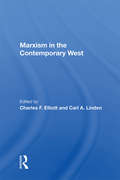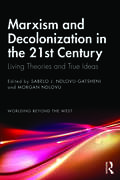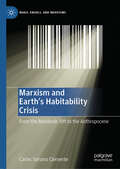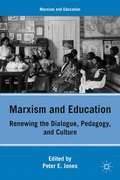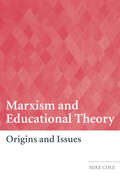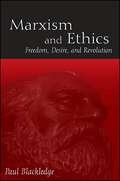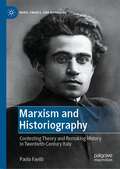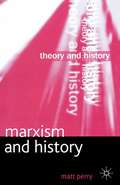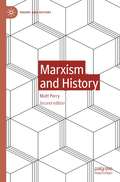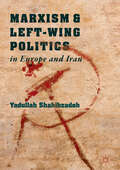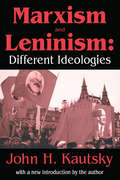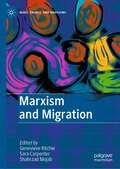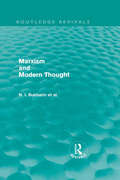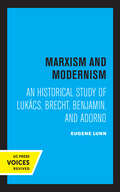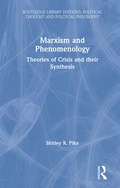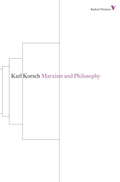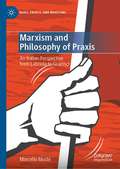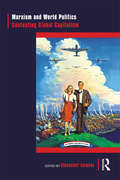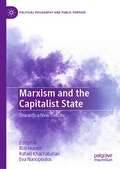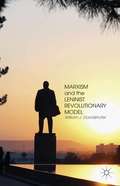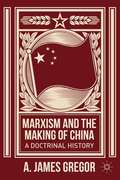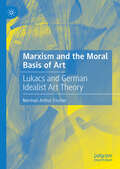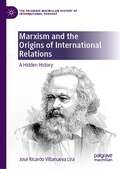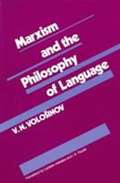- Table View
- List View
Marxism In The Contemporary West
by Charles F. ElliottWhat is the relationship between Marxist ideology and the politics of the contemporary West? The contributors to this book treat this question expansively, examining Marxism and the activities of European and Latin American communist parties in the broad context of contemporary Western politics. Their discussion encompasses not only political and p
Marxism and Decolonization in the 21st Century: Living Theories and True Ideas (Worlding Beyond the West)
by Sabelo J. Ndlovu-GatsheniMarxism and Decolonization in the 21st Century is a ground-breaking work that highlights the resurgence and insurgence of Marxism and decolonization, and the ways in which decolonization and decoloniality are grounded in the contributions of Black Marxism, the Radical Black tradition, and anti-colonial liberation traditions. Featuring leading and young scholars and activists, this book is a practical scholarly intervention that shows how democratic Marxism and decoloniality might converge to provoke planetary decolonization in the 21st century. At the centre of this process, enabled by both increasing human entanglements and the resilience of racism, the volume's contributors analyse converging forces of anti-imperialism, anti-colonialism, anti-patriarchy, anti-sexism, Indigenous People’s movements, eco-feminist formations, and intellectual movements levelled against Eurocentrism. This book will be of great interest to students, scholars, and intellectuals interested in Marxism, decolonization, and transnational activism.
Marxism and Earth's Habitability Crisis: From the Metabolic Rift to the Anthropocene (Marx, Engels, and Marxisms)
by Carles Soriano ClementeThis book argues that as long as capitalism is globally dominant, there must be a crisis of habitability on Earth. Overcoming this crisis is not a matter of technology. Technological strategies need to be adopted to mitigate human impact on Earth, but as long as they are implemented on a capitalist basis the crisis will not be overcome. Unfortunately, this is not fully understood today, and initiatives to confront the crisis based on idealism and positivism flourish everywhere. This makes research into the main epistemological reasons for the misunderstanding of the relationship between the reproduction of capital and the crisis of habitability an urgent task, which is undertaken throughout the book. Such misunderstanding is ultimately related to the old problem of philosophy, the relationship between thought and being. A problem that the crisis of habitability expresses as the insurmountable contradiction between capitalist humans and nature.
Marxism and Education
by Peter E. JonesMarxist thinking can offer a critical understanding of education in an international context. Jones tackles these issues from a variety of angles and perspectives, taking advantage of recent theoretical innovations in Marxist analysis as well as the personal experiences of educational practitioners with Marxist commitments. With a specific focus on pedagogical practices as cultural practices, this book combines detailed case studies of local situations with broad, critical overviews of global development and challenges. "
Marxism and Educational Theory: Origins and Issues
by Mike ColeWe live in a world where thousands make massive profits out of the labours of others, while those others exist as wage slaves, millions of whom die of starvation and poverty-related illness every year. The fundamental aim of Marxism is the overthrow of the anarchic, exploitative and eco-destructive system of world capitalism and its replacement by world socialism and equality. To build a socialist world is a task of gargantuan proportions, but one that Marxists believe is eminently achievable. This book addresses some of these challenges from within educational theory. The key theoretical issues addressed are: utopian socialism poststructuralism and postmodernism transmodernism globalisation, neo-liberalism and environmental destruction the new imperialism critical race theory. Marxism and Educational Theory compellingly and informatively propels the debate forward in the pursuit of that socialist future. In that quest, suggestions are made to connect theoretical issues with the more practical concerns of the school and the classroom. With a specially written Foreword by Peter McLaren, this timely book will be of interest to academics and students interested in educational theory, the sociology of education, sociology, politics, philosophy and critical theory.
Marxism and Ethics: Freedom, Desire, and Revolution (SUNY series in Radical Social and Political Theory)
by Paul BlackledgeMarxism and Ethics is a comprehensive and highly readable introduction to the rich and complex history of Marxist ethical theory as it has evolved over the last century and a half. Paul Blackledge argues that Marx's ethics of freedom underpin his revolutionary critique of capitalism. Marx's conception of agency, he argues, is best understood through the lens of Hegel's synthesis of Kantian and Aristotelian ethical concepts. Marx's rejection of moralism is not, as suggested in crude materialist readings of his work, a dismissal of the free, purposive, subjective dimension of action. Freedom, for Marx, is both the essence and the goal of the socialist movement against alienation, and freedom's concrete modern form is the movement for real democracy against the capitalist separation of economics and politics. At the same time, Marxism and Ethics is also a distinctive contribution to, and critique of, contemporary political philosophy, one that fashions a powerful synthesis of the strongest elements of the Marxist tradition. Drawing on Alasdair MacIntyre's early contributions to British New Left debates on socialist humanism, Blackledge develops an alternative ethical theory for the Marxist tradition, one that avoids the inadequacies of approaches framed by Kant on the one hand and utilitarianism on the other.
Marxism and Historiography: Contesting Theory and Remaking History in Twentieth-Century Italy (Marx, Engels, and Marxisms)
by Paolo FavilliEminent Italian historian Giovanni Levi once notably remarked that “no one is a Marxist anymore,” pointing to a paradox in Italian cultural history. While what is called "Marxism" was supposedly hegemonic over Italian culture, and especially history writing, for decades in the postwar period, it then seems to have suddenly disappeared. This study questions such a vision of a monolithic and hegemonic Marxism. It starts from the most effective anecdote to all ideologising narratives—that is, research into the texts themselves. It sees the Marxist historiography of the post-1945 period as a "history in the making," in which references to Marxian theory were a fundamental factor driving historiographical innovation. This allows the book to bring to light a highly original experience in the development of historiography, based on the long Italian tradition of reflection on historical knowledge.
Marxism and History
by Matt PerryMarxism and History examines Marxism's enormous impact on the way historians approach their subject. Tackling current historiographical questions in a lively, jargon-free way, Matt Perry offers a concise introduction to: Marxist views of history; key Marxist historians and thinkers; and the relevance of Marxist theory and history to students' own work.
Marxism and History (Theory and History)
by Matt PerryThis textbook examines Marxism’s enormous impact on the way historians approach their subject. Tackling current historiographical questions in an accessible way, the author offers a clear introduction to Marxist views of history, key Marxist historians and thinkers, and the relevance of Marxist theory and history to students’ own work. This is a concise, thorough overview of an important area of historiography. The second edition incorporates significant new developments in research, including Marxist contributions to the emergence of global, maritime and transnational history; the discovery of Marx’s ecologism and the historical critique of fossil capitalism as a source of environmental disaster; a reassessment of gender oppression through social reproduction theory; and the contribution of Marxism to debates on race, Eurocentrism and whiteness.
Marxism and Left-Wing Politics in Europe and Iran
by Yadullah ShahibzadehThis book reveals aspects of the rise and fall of the European and Iranian Left, their conceptualization of Marxism and ideological formations. Questions regarding the Left and Marxism within two seemingly different economic, political and intellectual and cultural contexts require comprehensive comparative histories of the two settings. This project investigates the intellectual transformations, which the European and Iranian Left have experienced after the Russian Revolution to the present. It examines the impacts of these transformations on their conceptualizations of history and revolution, domination and ideology, emancipation and universality, democracy and equality. The monograph will appeal to researchers, scholars and graduate students in the fields of political science, Middle Eastern and European studies, political history and comparative politics.
Marxism and Leninism: An Essay in the Sociology of Knowledge
by John H. KautskyOne of the pre-eminent scholars in the history and theory of European socialism, John Kautsky in this volume develops the argument that Marxism and Leninism are two quite different ideologies. He counterposes this view with the commonly accepted one of Leninism as simply one form that Marxism took in the course of its evolution. The easy identification of Marxism and Leninism with each other has been responsible for great confusion in the realm of both scholarly and political discourse.Kautsky develops his position within the tradition of the sociology of knowledge, by the close examination of the different meanings of the Marxist vocabulary as it was used by Marxists and Leninists. His frame of reference turns on the position of labor in turn-of-the-century industrial Europe and the role of modernizing intellectuals in underdeveloped countries. While the vocabulary used was often common to Marx and Lenin, Marxism was explicitly concerned with appeals to workers in industrial nations such as Germany and Austria, whereas Leninism appeals to revolutionaries in underdeveloped nations such as Russia and China.Whatever be the current assessment of the future of socialism and communism, Kautsky holds that it is important to study the core structure of both Marxism and Leninism, since they were major phenomena that powerfully affected the world in the twentieth century. Beyond that, in dealing with how different ideologies can be ensconced within the same rhetoric, the book offers an outstanding entrance into the sociology of knowledge as a tool for political analysis. This is a unique work in the function of language no less than the nature of ideology.The work is divided into five parts: Two environments, two ideologies, one terminology. The evolution of Marxism, its appeals in the German Empire. The evolution of Leninism, its appeals to strata involved in making modernizing revolutions. The differential outcomes of Marxism in the East and Leninism in the West. And finally, an examination of why Marxism and Leninism have been seen as a single ideology. In a new essay prepared for this new edition, Kautsky provides important autobiographical as well as historical reflections on how this book fits into the overall pattern of the author's work.
Marxism and Migration (Marx, Engels, and Marxisms)
by Sara Carpenter Shahrzad Mojab Genevieve RitchieThis book approaches migration from Marxist feminist, anti-imperialist, and anti-colonial perspectives. The present conditions of transnational migration, best described as a kind of social expulsion, include migrant caravans and detained unaccompanied children in the United States, thousands of migrant deaths at sea, the razing of self-organized refugee camps in Greece, and the massive dispersal of populations within and between countries. Placing patriarchal capitalism, imperialism, racialization, and fundamentalisms at the center of the analysis, Marxism and Migration helps build a more coherent and historically-informed discussion of the conditions of migration, resettlement, and resistance. Drawing upon a range of academic disciplines and diverse geopolitical regions, the book rethinks migrations from the vantage point of class struggle and seeks to ignite a more robust discussion of critical consciousness, racialization, militarization, and solidarity.
Marxism and Modern Thought (Routledge Revivals)
by N. I. Bukharin A. M. Deborin Y. M. Yuranovsky S. I. Vavilov V. L. Komarov A. I. TiumenievFirst published in English in 1935, this is a vital and stimulating critical appraisal of contemporary thought in the post-World War One era. Written by a selection of leading Marxist thinkers including Nikolai Bukharin, who would later become one of the most famous victims of Stalin's show trials, this work offers a Marxist critique of contemporary thought relating to philosophy, science and history. The authors all lean towards the view that the general tendency of modern thought is to abandon the historical method and to deny progress, with the conclusion that Marxism was the only historical and progressive outlook in science, philosophy and history in the period following the First World War and the Communist revolution in Russia. A fascinating document of great historical and political interest which offers an invaluable insight into contemporary thought in the Soviet Union of the 1930s.
Marxism and Modernism: An Historical Study of Lukacs, Brecht, Benjamin, and Adorno
by Eugene LunnThis title is part of UC Press's Voices Revived program, which commemorates University of California Press’s mission to seek out and cultivate the brightest minds and give them voice, reach, and impact. Drawing on a backlist dating to 1893, Voices Revived makes high-quality, peer-reviewed scholarship accessible once again using print-on-demand technology. This title was originally published in 1982.
Marxism and Phenomenology (Routledge Library Editions: Political Thought and Political Philosophy #45)
by Shirley R. PikeFirst published in 1986. The social sciences in the twentieth century have tended to fragment into different disciplines and schools of thought. Often these schools of thought are complete but closed systems of thought, permitting no exchange of ideas with other disciplines or schools. In view of this, one very interesting recent development has been the attempt by some Marxist theorists to develop a theory of phenomenological Marxism. At first sight the possibility of a liason between dialectical materialism and subjective idealism appears remote and indeed other Marxists have dismissed phenomenological Marxism as simplistic humanism, revisionist and incompatible with Marxist science. This book explores the possibilities and difficulties of synthesising two apparently disparate philosophical frameworks. It looks at the philosophical roots of the two frameworks and discusses the logic, epistemology, ontology and methodology of each. The author concludes that a synthesis between Marxism and phenomenology is not impossible on philosophical grounds.
Marxism and Philosophy
by Fred Halliday Karl KorschIn Marxism and Philosophy Korsch argues for a reexamination of the relationship between Marxist theory and bourgeois philosophy, and insists on the centrality of the Hegelian dialectic and a commitment to revolutionary praxis. Although widely attacked in its time, Marxism and Philosophy has attained a place among the most important works of twentieth-century Marxist theory, and continues to merit critical reappraisal from scholars and activists today.From the Trade Paperback edition.
Marxism and Philosophy of Praxis: An Italian Perspective from Labriola to Gramsci (Marx, Engels, and Marxisms)
by Marcello MustèThis book will offer a full reconstruction of the history of Theoretical Marxism in Italy between 1895 and 1935, based on a rigorous philological method. The starting term (1895) is marked by the publication of Antonio Labriola's first essay on historical materialism (In memory of Communist Manifesto); the final term coincides with the conclusion of the "Prison Notebooks" written by Antonio Gramsci. This book analyses the original character of the Marxist philosophy in Italy, which emerged by distinguishing itself from the "orthodoxy" of the Second and Third International. By delineating a significant chapter in the history of Marxism, the book will also propose a specific contribution to the history of Italian Philosophy, which is here studied in relation to the developments of European philosophy, beyond the traditional subdivisions of Positivism, Idealism and Marxism.
Marxism and Problems of Linguistics
by Joseph StalinThis book focused against dogmatism in Marxist thought on language, but it also presents irrefutable arguments against idealist, naturalist and formalist thinking on language as well as clarifying the Marxist approach and method on basic questions of linguistics.
Marxism and World Politics: Contesting Global Capitalism
by Alexander AnievasThis book brings together internationally-distinguished scholars from History, Philosophy, Development Studies, Geography, and International Relations (IR) to examine recent developments in Marxist approaches to world politics. Offering original and stimulating analyses of subjects traditionally at the forefront of Marxist studies of world politics, the collection also considers issues which have yet to be fully explored within a number of disciplines. Examining a wide array of topics ranging from the imperialism-globalization debate, the connections between social structures and foreign relations, the role of identity and imperialist norms in world politics, to the relationship between Marxist and Realist IR Theory, the contributors seek to further theoretical discussions and their implications for emancipatory radical politics. These contributions are structured around two major themes: • The relationship between capitalist modernity and the states-system in explaining the changing patterns of inter-state conflict and cooperation; • The debates within Marxist and IR discourses on the theoretical significance of ‘the international’, covering topics including uneven and combined development and passive revolution. An impressive collection that seeks to advance dialogue and research, Marxism and World Politics will be of interest to students and scholars of IR, International Political Economy, Political Science, and Historical Sociology.
Marxism and the Capitalist State: Towards a New Debate (Political Philosophy and Public Purpose)
by Rob Hunter Eva Nanopoulos Rafael KhachaturianThis book builds on the recent revival of interest in Marx and Marxism, calling for a renewal and refinement of Marxist state theory. It aims to provoke and encourage new debates and critiques that build on—but also update and extend—the rich tradition of Marxist analyses of the capitalist state, including the well-known debates of the 1970s. The chapters present a dynamic and diverse constellation of arguments and perspectives on a range of topics, from general re-appraisals of the capitalist state to investigations of contemporary challenges—including digitalisation, the ecological crisis, the coronavirus pandemic, social reproduction, and critical political economy. What they share is a commitment to an understanding of the specifically capitalist character of the modern state and its significance for any serious discussion of the causes of our current age of global catastrophe and the overcoming of capitalist social relations.
Marxism and the Leninist Revolutionary Model
by William J. DavidshoferThis book explores Marxist and Leninist revolutionary theory. Topics include: the philosophical dialectic, historical materialism, the revolutionary movement, and Communist cadre political rule in the socialist state. Emphasis on Lenin's wartime political treatment of imperialism, national self-determination, and socialism in one country.
Marxism and the Making of China
by A. James GregorAn assessment of the influence of the Marxism of Karl Marx and Friedrich Engels on revolutionary developments in China. The work covers the period from the first appearance of the Chinese Communist Party under Mao Zedong until its full transformation by Deng Xiaoping - into a nationalist, developmental, single-party, developmental dictatorship.
Marxism and the Moral Basis of Art: Lukács and German Idealist Art Theory
by Norman Arthur FischerThis book develops a moral Marxist aesthetics based on the work of Georg Lukács, Lucien Goldmann and Herbert Marcuse, and grounded in the aesthetic theories of German Idealist philosophers such as Hegel and Schiller. This moral-aesthetics takes three forms. The first is social and historical realism, as in Lukács and Goldmann. This is an aesthetics which fundamentally places the work of art within reality, particularly social and historical reality. The second aesthetics is utopian negation theory, and the third is formalism. The book pays special attention to Lukács’ concept of realistic historical novels, which he develops through the analysis of historical novels by Walter Scott, Honore de Balzac and Heinrich Mann. This theory of aesthetic realism is, as the book argues, grounded in Lukács’ reading of Hegel. The book concludes by offering fresh interpretations of the moral basis of Goldmann’s romantic realism in The Hidden God, and Marcuse’s emphasis on art as form and utopian negation of reality in The Aesthetic Dimension.
Marxism and the Origins of International Relations: A Hidden History (The Palgrave Macmillan History of International Thought)
by José Ricardo Villanueva LiraThis book investigates to what extent and in what ways Marxist writings and precepts on imperialism informed the so-called idealist stage of International Relations (IR). Though the formative years of International Relations coincide with a vibrant period in Marxist political thought, Marxism is strikingly absent from the historiography of the discipline. Building on the work of revisionist scholars, the book reconstructs the writings of five benchmark IR thinkers. Villanueva analyzes the cases of John Hobson, Henry Brailsford, Leonard Woolf, Harold Laski and Norman Angell to explore the influence that Marxism played in their thinking, and in the “idealist years” of the discipline more generally. He ultimately demonstrates that, although Marxist thought has been neglected by mainstream IR disciplinary historians, it played a significant role in the discipline’s early development. As such, this book both challenges the exclusion of Marxist thought from the mainstream disciplinary histories of IR and contributes to a deeper understanding of the role it played in early 20th century IR theory.
Marxism and the Philosophy of Language
by I. R. Titunik V. N. Volosnov Ladislav MatejkaVolosinov is out to undo the old disciplinary boundaries between linguistics, rhetoric, and poetics in order to construct a new kind of field: semiotics or textual theory. Matejka and Titunik have provided a new preface to discuss Volosinov in relation to the great resurgence of interest in all the writing of the circle of Mikhail Bakhtin.
